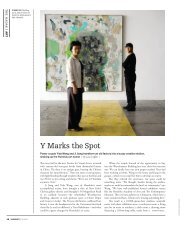The Scholarship of Teaching and Learning: TheoryâPractice - NAIRTL
The Scholarship of Teaching and Learning: TheoryâPractice - NAIRTL
The Scholarship of Teaching and Learning: TheoryâPractice - NAIRTL
You also want an ePaper? Increase the reach of your titles
YUMPU automatically turns print PDFs into web optimized ePapers that Google loves.
<strong>The</strong> <strong>Scholarship</strong> <strong>of</strong> <strong>Teaching</strong> <strong>and</strong> <strong>Learning</strong> 5<br />
the quality <strong>of</strong> learning experiences in a faculty certificate program<br />
(Baird, 1996; Hubball & Levy, 2004; Lawler & King, 2000; Lockhart<br />
& Borl<strong>and</strong>, 2001; McKeachie, 1997).<br />
Assessment Strategies. <strong>The</strong>se take into account learning context<br />
strategies <strong>and</strong> refer to the appropriate use <strong>of</strong> informal <strong>and</strong>/or formal<br />
feedback methods (e.g., self-reflection, peer-feedback, cohort discussions,<br />
facilitator-feedback, program evaluation input) to enhance a<br />
faculty member’s development toward a scholarly approach to teaching<br />
<strong>and</strong> learning (Angelo & Cross, 1993; Brookfield, 1995; Hinett &<br />
Thomas, 1999; Race, 1998; Hubball et al., 2004; Seijts, Taylor, &<br />
Latham, 1998).<br />
Programming Strategies. <strong>The</strong>se take into account learning context<br />
strategies <strong>and</strong> refer to a wide range <strong>of</strong> active learning experiences<br />
(e.g., cohort-based <strong>and</strong> individual learning activities, classroom-based<br />
<strong>and</strong> workshop-based experiences, prescribed <strong>and</strong> self-directed learning<br />
experiences, problem-based learning modules, development <strong>of</strong> a teaching<br />
dossier, action research assignments, guest speakers, use <strong>of</strong> video<br />
<strong>and</strong> learning technologies) in order for faculty participants’ to acquire,<br />
integrate, <strong>and</strong> apply their knowledge, abilities, <strong>and</strong> skills (Boud, 1996;<br />
Brew & Boud, 1996; Guskey & Sparks, 1996; Clarke & Hubball, 2001).<br />
Program Evaluation<br />
<strong>The</strong>re is a plethora <strong>of</strong> ways to evaluate a faculty certificate program<br />
on the SoTL. Process, impact, <strong>and</strong> follow-up evaluations provide a broad<br />
<strong>and</strong> long perspective through which to investigate contextually bound<br />
program processes <strong>and</strong> outcomes (Fullan, 1991; Green & Kreuter, 1999;<br />
Kreber & Brook, 2001; Mills, 2000; Owen, Fletcher, & Richards, 2001;<br />
Priest, 2001).<br />
Process Evaluations. <strong>The</strong>se focus on periodic assessments <strong>of</strong> issues<br />
<strong>of</strong> importance that arise throughout the program (formative). For<br />
example, how do faculty members best learn? To what extent do<br />
learning experiences draw upon best practice models for the SoTL?<br />
To what extent are program goals reflected in weekly learning experiences?<br />
What are the strengths <strong>and</strong> weaknesses <strong>of</strong> program learning<br />
experiences? To what extent are learning context, planning, assessment<br />
<strong>and</strong> programming strategies enhancing the SoTL for faculty members<br />
in a cross-disciplinary cohort? What needs to be improved, why, how?<br />
Impact Evaluations. <strong>The</strong>se focus on issues <strong>of</strong> importance that occur as<br />
a result <strong>of</strong> a program (summative) evaluation. For example, what sorts<br />
<strong>of</strong> learning outcomes actually occurred as a result <strong>of</strong> this program? How











